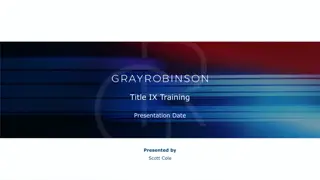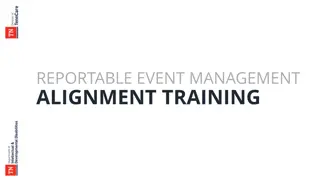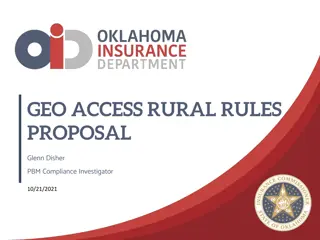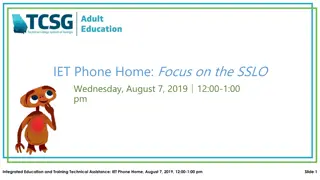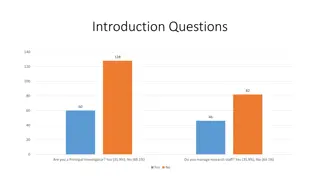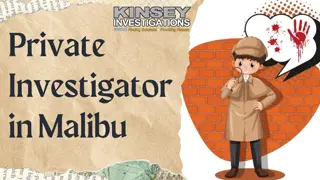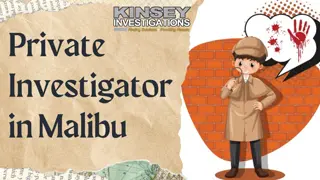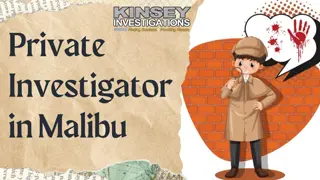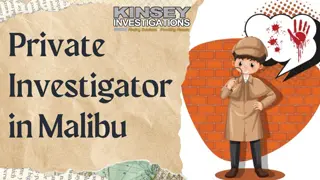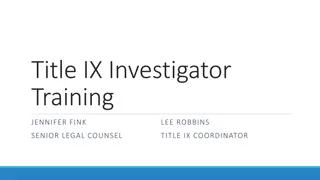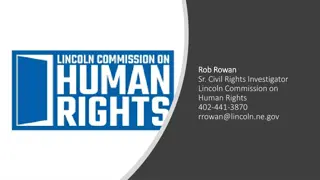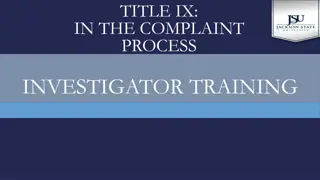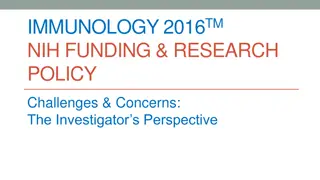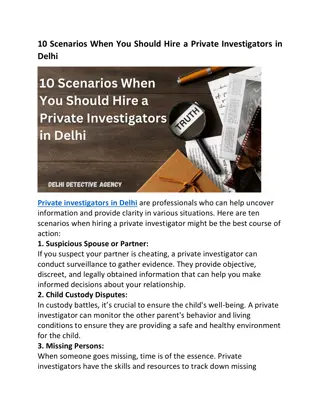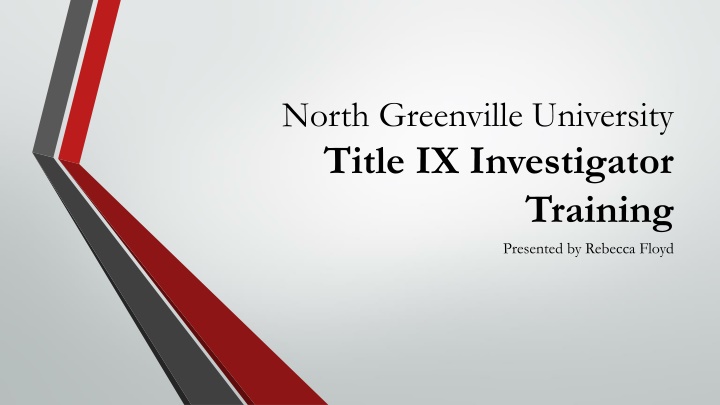
Title IX at North Greenville University
Learn about Title IX and its application at North Greenville University, including the definition of sexual misconduct, sexual harassment, and sexual assault. Discover the stages of investigation and the process of conducting an investigation under Title IX guidelines.
Download Presentation

Please find below an Image/Link to download the presentation.
The content on the website is provided AS IS for your information and personal use only. It may not be sold, licensed, or shared on other websites without obtaining consent from the author. If you encounter any issues during the download, it is possible that the publisher has removed the file from their server.
You are allowed to download the files provided on this website for personal or commercial use, subject to the condition that they are used lawfully. All files are the property of their respective owners.
The content on the website is provided AS IS for your information and personal use only. It may not be sold, licensed, or shared on other websites without obtaining consent from the author.
E N D
Presentation Transcript
North Greenville University Title IX Investigator Training Presented by Rebecca Floyd
Activities 1. What is Title IX/Title IX at NGU 2. The Title IX Process 3. Stages of Investigation/Pre-Investigation 4. Conducting the Investigation 5. Writing the Report
1. What is Title IX/Title IX at NGU No person in the United States shall, on the basis of sex, be excluded from participation in, be denied the benefits of, or be subjected to discrimination under any educational program or activity receiving Federal financial assistance. (20 U.S.C 1681) In simple terms, Title IX protects people from discrimination based on sex in education programs or activities that receive federal financial assistance.
Defining Sexual Misconduct Dating/Domestic Violence Stalking Bullying (sex or sex stereotypes) Sex Discrimination Sexual Harassment Sexual Assault Non-consensual Sexual Contact Sexual assault/rape
Sexual Harassment Unwelcome conduct of a sexual nature or based on sex Quid pro quo Individual in position of authority Conditions a benefit Sexual advance, favors, or other conduct of a sexual nature Hostile Environment [Student] Sufficiently serious that it denies or limits a student s ability to participate in or benefit from an educational program or activity. [Employee] Severe or pervasive enough to create a work environment that a reasonable person would consider intimidating, hostile, or abusive.
Sexual Assault Includes: Rape Fondling Domestic Violence Dating Violence Stalking
When does Title IX apply? All educational programs and activities and conduct on any NGU owned or controlled property. Examples: Classrooms, Dorms, Campus, Online, Internships, Field Trips, Club/Team Trips, etc.
Notes on Alcohol NGU has an amnesty policy for complainants and witnesses in furtherance of the truth. This may not apply to the respondent. When alcohol was involved, use the following scale, even if law enforcement can provide blood-alcohol levels: On a scale of 1 to 10 with 1 being completely sober and 10 being passed out drunk, rate yourself (and/or the other party) at this particular point. You should administer the scale at every point and at every time alcohol was consumed. Examples: At the party/bar/house At the time you left the party/bar/house At the time you arrived at your dorm/house/location If both parties were consuming alcohol, ask both to rate themselves and each other at every point as above.
2. The Title IX Process 1 2 3 4 5 6 Determine if Title IX or Conduct Title IX Formal or Informal Process (Informal Resolution or Formal Investigation) Formal Investigation Adjudication (Panel of trained adjudicators) Appeal Intake (Interim Measures & Initial Assessment)
The Investigation Process at NGU Complaint is vetted to determine if it rises to a Title IX issue. Interim measures instituted, if needed. Complaint is received. Investigator is assigned. Investigator re-interviews complainant and respondent to give both parties a chance to respond to the statements of the other (if needed). Investigator interviews complainant and respondent (after 10 days).* Investigator interviews witnesses and collects evidence. Respondent is served a Statement of Allegations. Responses to the Preliminary Findings are incorporated into the final report, which is sent to both parties and Adjudication Panel. Preliminary Findings are presented to both parties, prior to the Adjudication Panel, and parties have 5 days to respond, if desired. Investigator writes a narrative, Preliminary Findings, for the Adjudication Panel
Before the Investigation Begins Things to be aware of: Our investigation takes place either concurrently (but separate from) or in lieu of a criminal investigation. If you re not told, then ask if the subject of the complaint is harassment or assault. Confirm that the respondent has been notified before you set up an appointment. We can NEVER discourage the complainant from filing a police report. Ask about interim measures that are in place. The in-take process will handle the following: Protect the complainant. Notify both parties of his/her rights, including available interim measures and services. Notify complainant of right to report to law enforcement. Follow up with written notification of rights. Notify campus security, if necessary. Notify respondent of complaint.
3. Stages of Investigation/Pre-Investigation 1. Interview complaint and respondent and outline investigation. 2. Interview witnesses and gather other evidence. 3. Review/revise/re-interview, as needed. 4. Write up Statement of Findings/Preliminary Report. 5. Consider responses of parties to Statement of Findings, as needed. 6. Write up Final Statement of Findings.
Characteristics of a Good Investigation Prompt There are no fixed time frames, but delays must be justified. Conflicts and appearances of conflicts are disclosed and managed. Inform parties and witnesses that retaliation is prohibited. Impartial Thorough, Adequate, Reliable, Fair Interview both parties. Equal opportunity for parties to identify/present witnesses, evidence. Right to an advisor, both parties. Written notice of outcome of complaint.
Prior to the Interview Secure an appropriate meeting location and allow for enough time to conclude interview. Provide written notice of the meeting to both parties. Inform both parties of their right to have an advisor present. Prepare for meeting by reviewing notes/creating questions prior to the meeting.
Title IX Advisors A Title IX advisor is a person who supports and advises a party in a Title IX case. Their role is to help the party navigate the process, and they can be present at meetings, interviews, hearings, and appeals. A Title IX advisor can be anyone, including a friend, family member, or attorney. The party can choose their own advisor, or the school or university can appoint one if requested.
4. Conducting the Investigation Stay organized. Keep details of who you interviewed and when. Consider recording interviews. Type up your notes at your earliest convenience. Keep a file of all documents and notes. Think about how you will summarize the facts in your report to help assess whether you ve gathered all the information/evidence you need. Draft as you go. Set up your chapters and fill in the information.
Expectations What they should expect of you: Neutral party. Your only job is to record the facts. Listen. All information will be kept private. What you will do with any recording/notes. That you will have to ask difficult/awkward questions. This will not be their only opportunity to speak with you. Notify both parties of opportunity for follow up interviews, and what may come next. If you don t know the answer to their question, let them know that either you or Dr. Kramer will get them an answer. What you expect of them: Honestly. That they will seek clarify if needed (give them permission to do so). That they won t guess or fill in blanks. That they continue to keep the process confidential.
The Investigative Plan An investigative plan is critical to ensure that you: Have a clear course of action. Stay organized throughout the investigation. Ensure that you capture all relevant aspects of the case. Demonstrate fairness and equality to both parties.
Working with the Complainant/Respondent Slow down. Make him/her feel comfortable. Set expectations. Explain the process. Remind of the ability to ask questions and present information during the entire process. Recognize the impact of trauma on memory. Allow him/her to give a narrative (written if that is more comfortable). Use account or experience rather than story . Allow advisor/support person to be present. Be transparent about how information will be used.
Working with the Complainant Have a prepared response when he/she asks what actions are going/likely to be taken against the respondent. Consider the following: My role is to gather information. At this point, I m still gathering facts and not making any decisions. That will be taken up by the Adjudication Panel. Not counseling; point to resources on campus. You cannot say, I m sorry this happened to you. .
Working with the Respondent Recognize the stress involved with being accused of sexual misconduct. He/she may be defensive. He/she may be nervous or uncomfortable. Explain fair process. Use impartial language. Afford the same opportunity to provide narrative of experience, to provide physical or other evidence.
The Important Question to Ask: Sexual Assault Ask the Complainant: By what words or actions did you convey or communicate to the respondent a lack of consent for [said actions]? Ask the Respondent: By what words or actions did the complainant convey or communicate consent for [said actions]?
Subsequent Events Note any actions and communications that have taken place since the incident. Remind both parties and any witnesses that talking about the incident with other people may be interpreted as retaliation by one of the two parties. Note any unresolved issues or areas of concern.
Wrap Up Interview Is there anything more that you would like me to know? Is there anything you thought that I would ask that I did not? What do you want the outcome of this case to be?
The Investigative Plan: Phase 1 The Preliminaries List the allegations that will be investigated. Confirm that respondent has received notice of allegations. Confirm that both complainant and respondent have received copies of the NGU Title IX policy and have been notified of available resources. Determine if there are any interim measures in play or if legal charges are pending. Set up interview with Complainant. Begin timeline.
The Investigative Plan: Phase 2 The Complainant Set up initial interview with complainant. Gather and review available evidence. Begin to create chronology of events. Identify sources of evidence. Physical evidence (e.g., text messages, emails, surveillance video, evidentiary examination, student/personnel files, etc.). Ask about denial of consent. Ask about alcohol. Determine which witnesses should be interviewed and in what order. Discuss non-retaliation and confidentiality. Request to contact if further information. Prepare a summary immediately following interview. Note all meetings and interviews on timeline. Update both parties weekly regarding status of investigation.
The Investigative Plan: Phase 3 The Respondent Determine if the respondent has been the subject of other complaints. Verify that 10 days have passed since respondent received Notice of Allegations. Set up initial interview with respondent. Gather and review available evidence. Physical evidence (e.g., text messages, emails, surveillance video, evidentiary examination, student/personnel files, etc.). Continue to work on chronology of events. Identify sources of evidence. Ask about consent. Ask about alcohol. Determine which witnesses should be interviewed and in what order. Discuss non-retaliation and confidentiality. Request to contact if further information. Prepare a summary immediately following interview. Note all meetings and interviews on timeline. Update both parties weekly regarding status of investigation.
The Investigative Plan: Phase 4 The Witnesses Determine what information you need to substantiate the accounts by both parties. Identify and strategize order for witnesses. Identify topics for interviews. Familiarize yourself with the setting(s) of the events. Familiarize yourself with the witnesses as best you can. Notify parties of meetings/interviews with the other party and all witnesses. Attempt to establish chronology of events. Ask witnesses to forward evidence/information immediately. Is there anything else? Discuss non-retaliation and confidentiality. Request to contact if further information. Prepare a summary immediately following interview. Note all meetings and interviews on timeline. Update both parties weekly regarding status of investigation.
The Investigative Plan: Phase 5 Review, Revise, Re-interview Note all factual discrepancies. Assess additional investigation needs. Determine whether additional witnesses should be interviewed. Determine whether follow-ups with any previous witnesses are necessary. Re-interview complainant regarding respondent comments and interview findings. Solicit feedback to potentially include in preliminary report. Re-interview respondent regarding complainant comments and interview findings. Solicit feedback to potentially include in preliminary report. Update both parties weekly regarding status of investigation.
The Investigative Plan: Phase 6 The Preliminary Report Include any additional thoughts or impressions relevant to the outcome of the investigation. Evaluate the report on the basis of its thoroughness: will someone who knows nothing about this case be able to understand, assess and make a determination of more than likely based on your written report. Submit report to chief investigator or Title IX coordinator for review. Update both parties weekly regarding status of investigation. Prepare a narrative of the chronology of the events leading up to the incident, the incident and the aftermath. Include all relevant witness statements, including those that corroborate or fail to support statements by either party. Summarize evidence and facts gathered. Make a determination of credibility. Note any discrepancies.
5. Writing the Report Remember that you re telling the story, as dispassionately as possible, to a panel of people who have not interviewed all persons of interest. Keep it chronological, as much as possible. Acknowledge that much of the report will be he said-she said, but remain objective.
Report Writing - Using a Story Board The chapters of your story from every party should include: History/Background Leading up to the Incident(s) Immediately prior to the incident(s) Accounts of the incident(s) Immediately after the incident(s) Subsequent events and/or notes Think of the interviewing process as gathering information to write a story.
Outline the Investigation III.Interview all witnesses a) Provided by Complainant b) Provided by Respondent c) Persons of Interest IV.Re-Interview as needed to fill gaps V. Final Interview, as needed, with both parties to tell them what the other said and get their responses I. Interview the complainant, using Story Board if possible a) Ask for list of witnesses b) Ask for evidence, if applicable II. Interview the respondent, using Story Board if possible a) Ask for list of witnesses b) Ask for evidence, if applicable
Keeping a File Keep a list with names, dates and locations of everyone interviewed, including phone calls. Include all evidence, even if it is not used. If one party supplies names of witnesses that were not interviewed, provide a note about why they were not included. Include copies of the initial complaint and statement of allegations. Hand-written notes are okay occasionally but should not constitute the bulk of your interview notes. Always note the time, date and place of the interview on the interview notes.
Keeping a Timeline You MUST keep a detailed log of your activity during the course of the investigation. You must note when any correspondence with either parties occurs. You must note when any interviews occur. You must keep parties apprised of the status of the investigation and this should also be logged. If there is a delay, the reason and duration for the delay must be documented and communicated to both parties.
A Couple of Other Points Any advisor that is present for an interview may only participate in the interview for points of clarity. He/she may not answer for the interviewee. Any student or employee at NGU who is a named witness is compelled to speak with Title IX investigators. If you run into problems with this, report it. Our investigations are separate from those by Campus Security or law enforcement, however we can (and they should) share information.

